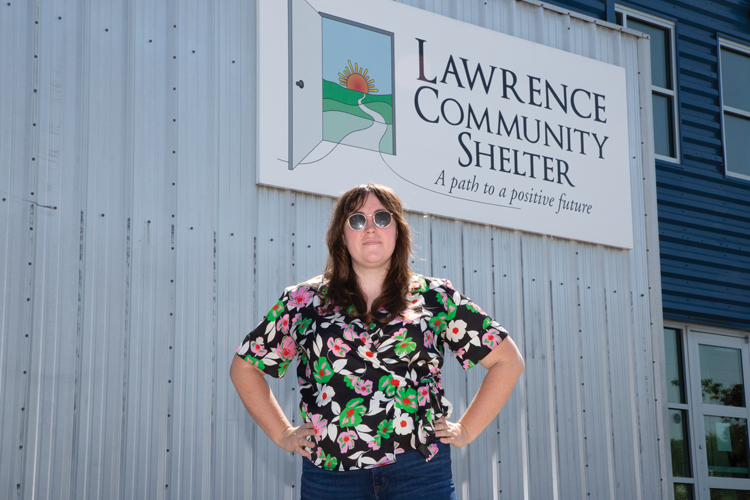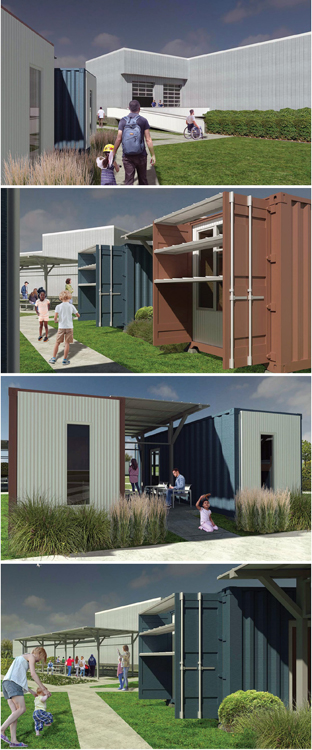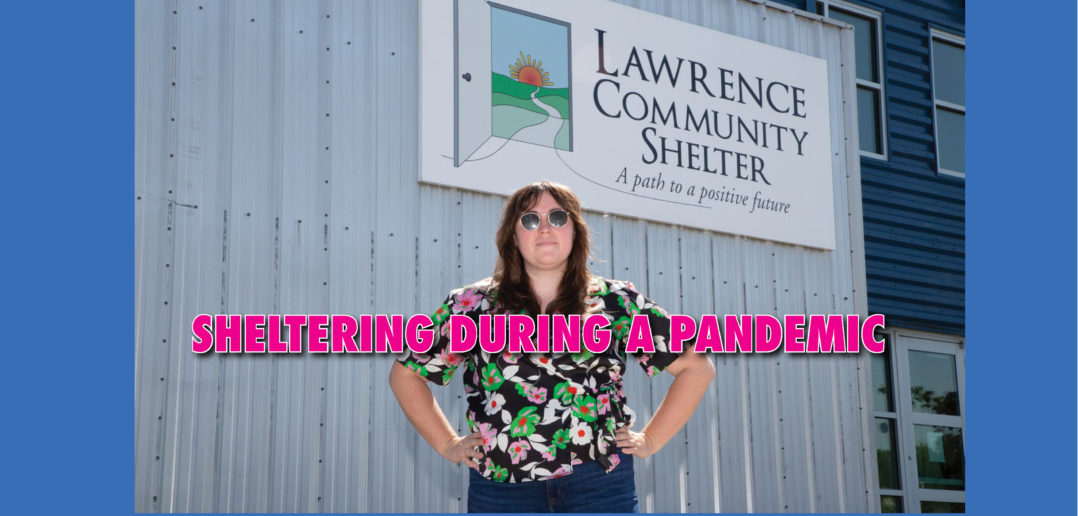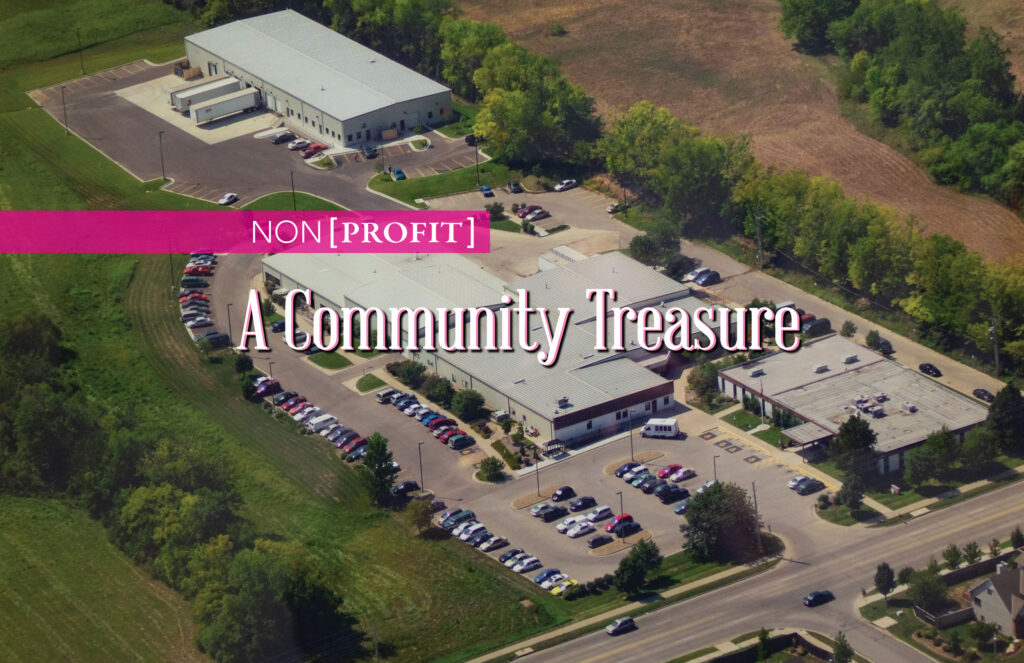| story by | |
| photos by | Steven Hertzog |
The Lawrence Community Shelter is working toward placing the homeless in permanent housing situations to protect them from COVID-19 and keep them off the streets for good.

Renee Kuhl Executive Director LCS.
When the coronavirus pandemic hit in March, the Lawrence Community Shelter worked hardest at sending people out of the shelter instead of bringing people in to be safe, as is its usual mission. The shelter was trying not to shelter.
The congregate living configuration at the shelter was not conducive to containing the virus. People were sent away after a shortened stay—but not back out on the streets. Instead, many were placed in housing and apartments in the community that could become their permanent housing.
“You can’t stay home if you don’t have a home,” says Renee Kuhl, the shelter’s executive director. “Homelessness is a public health crisis, and it was before COVID. The virus has provided more opportunities for us to continue to reframe our focus on housing.”
Kuhl’s focus since her arrival as executive director in August 2019, long before a pandemic was on the horizon, has been to move people more quickly out of the shelter and into housing in the community. The shelter is now an adherent to “rapid rehousing,” a movement championed by the National Alliance to End Homelessness. The philosophy of rapid rehousing, Kuhl says, is to make people’s bout with homelessness a brief, one-time occurrence so that it minimizes the emotional trauma and health consequences, and allows them to reenter the community quickly.
“The issue of homelessness is man-made, and there are solutions. We, as a community, need to look to solve this whole thing,” she says. “The shelter is not the place where the journey toward stability ends; it’s where it starts. It ends in a home.”
When the pandemic hit, and the stay-at-home order was issued, Kuhl says she quickly partnered with other agencies such as The Willow Domestic Violence Center and Family Promise, which were also faced with people living in congregate situations. Together, they connected with landlords and provided people with funds for security deposits and the first month’s rent so they could move into their own space. Bert Nash Community Mental Health Center is now running the program, which provides up to six months’ rent and is intended to be a permanent situation.
“In March, my focus was getting people out to apartments. We were able to get all of our families out within six weeks,” Kuhl says.
As rapid rehousing continues, Kuhl is embarking on a special new project with a $500,000 donation and in-kind fund-raising campaign to address the shared living space on-site in the shelter. Studio 804, a University of Kansas architecture design-build nonprofit, approached Kuhl and the shelter this summer with the concept of constructing tiny homes on the shelter grounds.

Monarch Village renderings, courtesy Dan Rockhill/Studio 804
Even with the emphasis on permanent housing, there are still those who will need to stay while awaiting their housing, and for those who are not eligible for rapid rehousing, they will need a place while addressing other needs such as employment or substance abuse. Dan Rockhill, the architecture professor who leads Studio 804, drew up plans this summer to construct the tiny homes out of shipping containers. Each home will have plumbing, with a bathroom and a kitchenette, Kuhl says, and can house two adults or one adult and two or three children. With separate bathrooms and kitchens, the homes will be ideal for isolating or quarantining, while residents benefit from the shelter’s resources. Construction began in September, and Kuhl says she hopes to have all 12 homes sheltering people by March.
“Studio 804 is finding donations for materials and the shipping containers, and we’re fund-raising to complete the infrastructure,” Kuhl says. “Everyone is excited to partner with us, because this is a hard time, and this is one way to tangibly make a real difference right now.”
The tiny homes are called Monarch Village, because they surround a butterfly waystation. The shelter is also building an ADA-compliant (Americans With Disabilities) deck in the back of the shelter so all residents can more easily access the outdoor shelter grounds during their stay.
CARES Act funding, which the shelter secured this fall, will provide hotel vouchers, allowing families to continue to stay off-site in a more private setting than the shelter. The money for those vouchers must be spent before the end of the year. The CARES Act is also funding a legal campsite that the city will establish, in which Kuhl anticipates the shelter will play a role.
The pandemic sped up many of the initiatives Kuhl already was pursuing as executive director. Also, with more funding available from the federal government through both Housing and Urban Development grants and the CARES Act, she has already initiated ideas in the community. She says she is watching the economy closely, because she doesn’t think the full impact has landed in Lawrence just yet.
“There might be a surge of people homeless this winter, so we’re trying to develop solutions. Our primary goal is getting a housing outcome. We already have a lot of people in their second or third instance of homelessness [previous to COVID]. This is a tough time to be chronically homeless,” Kuhl says.
Affordability of rent, a common complaint and refrain in Lawrence elections, continues to be a challenge for the shelter, as well. Kuhl says because of new connections with landlords forged during the pandemic, she is hoping to find solutions for people who are on disability or have criminal records that limit their employment and income prospects. Already, people have been approved for federal programs such as Section 8 more quickly than before the pandemic.
“Prior to COVID, Douglas County didn’t have near enough rental assistance,” she says.
The coronavirus outbreak likely will have a lasting impact on the Lawrence Community Shelter, and it may look more like a silver lining than anything.
“Long-term, this outbreak will have changed how we address homelessness,” Kuhl says. “It’s amazing to be part of the community shift of how we deal with homelessness.”




